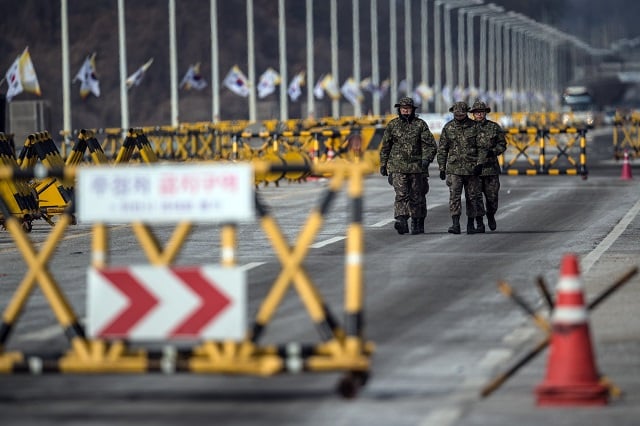
Technically, North and South Korea are still at war, and have been for more than six decades — but an “absolutely earth-shaking” new report on Tuesday indicates the conflict may soon be coming to an end.
Citing an anonymous South Korean diplomatic official, Munhwa Ilbo — a South Korean daily newspaper — reported that the neighboring countries are hashing out a statement that could officially bring the war to an end later this month, when North Korean leader Kim Jong-un and South Korean President Moon Jae-in are set to meet in person for the first time.
As CNBC reports:
Kim and Moon could also discuss returning the heavily-fortified demilitarized zone separating them to its original state, the newspaper said.
Pyongyang and Seoul have technically been at war since the 1950-1953 Korean conflict ended with a truce — and not a peace treaty. Geopolitical tensions have occasionally flared up since the armistice, although to date both countries have managed to avoid another devastating conflict.
A successful summit between the Koreas later this month could help pave the way for a meeting between Kim and President Donald Trump. The U.S. president and North Korean leader are poised to hold talks in late May or June, according to the Korean Central News Agency (KCNA).
The groundbreaking report comes as Kim has increasingly expressed his willingness to discuss denuclearization of the Korean Peninsula — an openness that foreign policy experts have attributed to South Korea’s “masterful” diplomacy, not President Donald Trump’s “fire and fury” threats and warmongering.
Korea experts and journalists argued that if the new report is true, it is major news for the Korean Peninsula and a crucial step toward establishing permanent peace in the region.
HUGE if true. Absolutely earth-shaking. https://t.co/LZEmxrL3hp
— Tim Shorrock (@TimothyS) April 17, 2018
If this is confirmed, this is huge for the Korean Peninsula. North and South Korea are still technically at war and have not signed an official peace treaty, just an armistice agreement https://t.co/Fci1siZYuz
— Joseph Kim (@josungkim) April 17, 2018
Join us in defending the truth before it’s too late
The future of independent journalism is uncertain, and the consequences of losing it are too grave to ignore. To ensure Truthout remains safe, strong, and free, we need to raise $27,000 in the next 24 hours. Every dollar raised goes directly toward the costs of producing news you can trust.
Please give what you can — because by supporting us with a tax-deductible donation, you’re not just preserving a source of news, you’re helping to safeguard what’s left of our democracy.